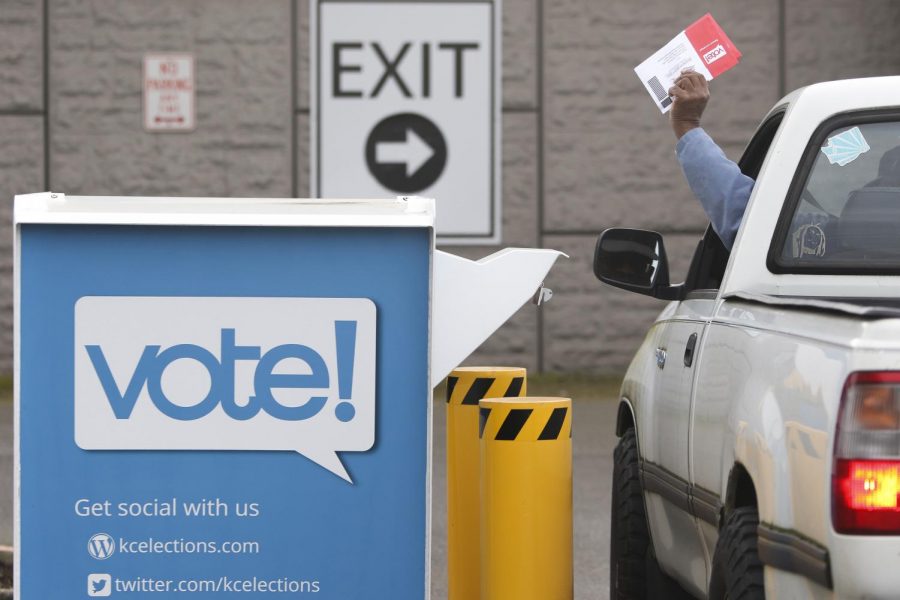Opinion | You’ve got mail(-in ballots)
Jason Redmond, Getty Images | TNS
Voters drop off their presidential primary mail-in ballots at a drop box at King County Elections in Renton, Washington, on March 10.
April 13, 2020
The primary elections in Wisconsin last week were an unnecessary disaster.
Thousands of people across the state showed up to the polls last Tuesday, despite the risk posed by COVID-19, because it was the only way they would be able to vote. I can’t blame anyone who showed up to exercise their right to vote despite the risks the same way that I don’t blame anyone who stayed home. We are in unprecedented times and these choices aren’t simple.
However, voters shouldn’t be forced to make these tough choices in the first place.
In the midst of a global pandemic, our government should not be asking us to choose between exercising our civic rights and duties or staying safe at home and not voting. All of us should be able to participate in upcoming elections without risking our own health or public health. Many states still have primaries in the upcoming months, and the entire country has an extremely important general election in November, which is exactly why we need nationwide vote-by-mail to be implemented.
Vote-by-mail just means that instead of showing up to your polling station on election day, you fill out a ballot from the safety of your own home and then mail that ballot in by election day. It’s a fairly simple process that many states already have in place, whether it’s through absentee voting that usually requires an excuse or through all-mail elections, where ballots are automatically mailed to every registered voter in the states that have it. Since every state already has some form of vote-by-mail — whether that’s all-mail elections or absentee ballots — it shouldn’t be too difficult for others to implement it, especially if they start working towards doing so now and states are given funding by the federal government to do so.
Considering the relative ease of the transition and the fact that we’re in the middle of a global pandemic with several primary elections and a presidential election not too far away, you’d think that a nationwide shift to vote-by-mail would have wide bipartisan support. But, unfortunately, that’s not the world we live in.
“Republicans should fight very hard when it comes to statewide mail-in voting,” President Donald Trump tweeted last week. “Democrats are clamoring for it. Tremendous potential for voter fraud, and for whatever reason, doesn’t work out well for Republicans.”
Trump isn’t the only Republican to make those claims. Rep. Thomas Massie, R-Ky., tweeted that “universal vote by mail would be the end of our republic as we know it.” Other Republicans have joined them in disparaging vote-by-mail, mostly claiming that it leads to voter fraud and will result in more Democrats being elected.
However, their claims are completely unfounded. Voter fraud in general is extremely rare and the five states that currently vote almost wholly by mail rarely report fraud. Republican opposition to vote-by-mail really makes no sense, especially considering that Republicans like Trump actually voted by mail. Their opposition is not only hypocritical and nonsensical — it’s proven to be straight up dangerous.
In Wisconsin, the reason why voters were forced to make the choice between voting and potentially endangering their health was mainly because of Republican opposition to mail-in ballots.
Wisconsin’s Democratic governor, Tony Evers, requested that absentee ballots be mailed to all voters or for the primary to be postponed. The Republican-controlled legislature refused both requests, so Evers issued an executive order to postpone the primary until June. Then, Wisconsin’s State Supreme Court — which has a majority of conservative justices — overturned the governor’s executive order to postpone the election in a split vote along ideological lines. The Supreme Court of the United States also ruled against Evers’ efforts to postpone voting in the election, declining to extend the deadline for absentee voting in a 5-4 split thanks to its conservative justices.
These justices decided to risk the safety of thousands of Wisconsin citizens and set a dangerous precedent for voting rights during this pandemic — and in general — for no discernible reason.
“The question here is whether tens of thousands of Wisconsin citizens can vote safely in the midst of a pandemic,” Justice Ruth Bader Ginsburg wrote in her dissent. “With the majority’s stay in place, that will not be possible. Either they will have to brave the polls, endangering their own and others’ safety. Or they will lose their right to vote, through no fault of their own.”
Vote-by-mail has been turned into a partisan issue by members of the judicial system and our elected leaders, but it shouldn’t be one. What happened in Wisconsin should serve as a warning to the rest of the country for their primary elections and for the general election in November. We need to take action now to switch the remaining primaries to vote-by-mail and we need to ready mail-in ballots for the general election in November because we really don’t know how long this pandemic is going to last.
Devi primarily writes about politics for The Pitt News. Write to her at [email protected] and follow her on Twitter for more hot takes @DeviRuia.









